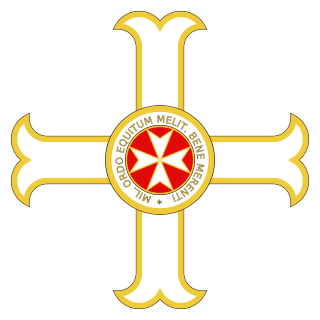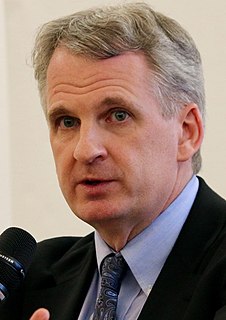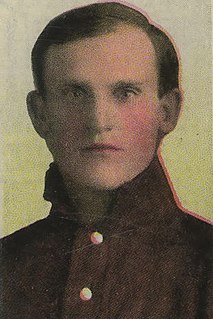Related Research Articles
The Presidential Medal of Freedom is an award bestowed by the president of the United States to recognize people who have made "an especially meritorious contribution to the security or national interests of the United States, world peace, cultural or other significant public or private endeavors." The Presidential Medal of Freedom and the Congressional Gold Medal are the highest civilian awards of the United States. The award is not limited to U.S. citizens and, while it is a civilian award, it can also be awarded to military personnel and worn on the uniform. It was established in 1963 by President John F. Kennedy, superseding the Medal of Freedom that was established by President Harry S. Truman in 1945 to honor civilian service during World War II.

The United States Holocaust Memorial Museum (USHMM) is the United States' official memorial to the Holocaust. Adjacent to the National Mall in Washington, D.C., the USHMM provides for the documentation, study, and interpretation of Holocaust history. It is dedicated to helping leaders and citizens of the world confront hatred, prevent genocide, promote human dignity, and strengthen democracy.

Andreas Maislinger is an Austrian historian and political scientist and founder and chairman of the Austrian Service Abroad, including the Gedenkdienst, the Austrian Social Service and the Austrian Peace Service. He also is the founder of the Austrian Holocaust Memorial Award, the Braunau Contemporary History Days and the inventor of the idea of the House of Responsibility regarding the birthplace of Adolf Hitler.

Gedenkdienst is the concept of facing and taking responsibility for the darkest chapters of one's own country's history while ideally being financially supported by one's own country's government to do so. Founded in Austria in 1992 by Dr. Andreas Maislinger the Gedenkdienst is an alternative to Austria's compulsory national military service as well as a volunteering platform for Austrians to work in Holocaust- and Jewish culture-related institutions around the world with governmental financial support. In Austria it is also referred to as Austrian Holocaust Memorial Service provided by the Austrian Service Abroad. The Austrian Gedenkdienst serves the remembrance of the crimes of Nazism, commemorates its victims and supports Jewish cultural future. The program is rooted in the acknoledgment of responsibility by the Austrian government for the crimes committed by National Socialism.
Authorized foreign decorations of the United States military are those military decorations which have been approved for wear by members of the United States armed forces but whose awarding authority is the government of a country other than the United States.

Leopold Engleitner was an Austrian conscientious objector, as a Jehovah's Witnesses, and a concentration camp survivor who spoke publicly and with students about his experiences. He was the subject of the documentary Unbroken Will. Before his death Engleitner was the world's oldest known male concentration camp survivor, and the oldest male Austrian.

Beginning with the invasion of Poland during World War II, the Nazi regime set up ghettos across German-occupied Eastern Europe in order to segregate and confine Jews, and sometimes Romani people, into small sections of towns and cities furthering their exploitation. In German documents, and signage at ghetto entrances, the Nazis usually referred to them as Jüdischer Wohnbezirk or Wohngebiet der Juden, both of which translate as the Jewish Quarter. There were several distinct types including open ghettos, closed ghettos, work, transit, and destruction ghettos, as defined by the Holocaust historians. In a number of cases, they were the place of Jewish underground resistance against the German occupation, known collectively as the ghetto uprisings.

An order of merit is an honorific order that is conferred by a state, government, royal family, or other sovereign entity to an individual in recognition of military or civil merit. The historical background of the modern honours system of orders of merit may be traced to the emergence of chivalric orders during the Middle Ages.
Erwin Schild, is a Canadian Conservative rabbi and author.

Timothy David Snyder is an American author and historian specializing in the history of Central and Eastern Europe and the Holocaust. He is the Richard C. Levin Professor of History at Yale University and a Permanent Fellow at the Institute for Human Sciences in Vienna. He has written several books, including the best-sellers Bloodlands: Europe Between Hitler and Stalin and On Tyranny: Twenty Lessons from the Twentieth Century.

Holocaust victims were people targeted by the government of Nazi Germany based on their ethnicity, religion, political beliefs, or sexual orientation. The institutionalized practice by the Nazis of singling out and persecuting people resulted in the Holocaust, which began with legalized social discrimination against specific groups, involuntary hospitalization, euthanasia, and forced sterilization of persons considered physically or mentally unfit for society. The vast majority of the Nazi regime's victims were Jews, Sinti-Roma peoples, and Slavs but victims also encompassed people identified as social outsiders in the Nazi worldview, such as homosexuals, and political enemies. Nazi persecution escalated during World War II and included: non-judicial incarceration, confiscation of property, forced labor, sexual slavery, death through overwork, human experimentation, undernourishment, and execution through a variety of methods. For specified groups like the Jews, genocide was the Nazis' primary goal.

Peter Longerich is a German professor of history. He is regarded by fellow historians, including Ian Kershaw, Richard Evans, Timothy Snyder, Mark Roseman and Richard Overy, as one of the leading German authorities on the Holocaust.

The Holocaust, also known as the Shoah, was the genocide of European Jews during World War II. Between 1941 and 1945, Nazi Germany and its collaborators systematically murdered some six million Jews across German-occupied Europe, around two-thirds of Europe's Jewish population. The murders were carried out in pogroms and mass shootings; by a policy of extermination through labor in concentration camps; and in gas chambers and gas vans in German extermination camps, chiefly Auschwitz-Birkenau, Bełżec, Chełmno, Majdanek, Sobibór, and Treblinka in occupied Poland.

Randolph Lewis Braham was an American historian and political scientist, born in Romania, Distinguished Professor Emeritus of Political Science at the City College and The Graduate Center of the City University of New York. A specialist in comparative politics and the Holocaust, he was a founding board member of the academic committee of the United States Holocaust Memorial Museum (USHMM), Washington, D.C., and founded The Rosenthal Institute for Holocaust Studies at the Graduate Center in 1979.
Andrew Ezergailis is a retired Professor of History, Ithaca College, Ithaca, New York, United States, known for his research into the 20th-century history of Latvia, particularly of the 1917 Revolution and the Holocaust in Latvia.

Warren Miller is a Member and former Chairman of the U.S. Commission for the Preservation of America's Heritage Abroad, the agency of the U.S. Government charged with helping to protect and preserve memorials, historic sites, buildings, cemeteries, and other property in Central and Eastern Europe, including parts of the former Soviet Union, important to the foreign heritage of Americans. While Chairman, he negotiated on behalf of the United States 19 bilateral agreements concluded with governments of the region. These agreements provide for cooperation in preserving sites and commit governments to prevent discrimination against minority groups.
The Holocaust Memorial Center is a renovated synagogue that dates back to the 1920s and serves as a memorial and museum for and about Hungarian Jews that were murdered in the Holocaust. While largely focused on Jews, the museum also mentions the discrimination and killings of Romani, homosexuals, and the disabled. It is located in Budapest, Hungary.

Berthold Beitz was a German industrialist. He was the head of the Krupp steel conglomerate beginning in the 1950s. He was credited with helping to lead the re-industrialization of the Ruhr Valley and rebuilding Germany into an industrial power. He gained acclaim for saving some 250 Jewish workers during World War II by declaring them to be essential workers at an oil facility in Poland. In 1973, for saving Jews, he received the Righteous Among the Nations title awarded by the Israeli Yad Vashem, the highest honor given to a non-Jew.
The following is a comprehensive list of orders, decorations, and medals bestowed by the Sovereign Military Order of Malta, both in the present-day and historically.
Martin C. Dean is a research scholar at the Center for Advanced Holocaust Studies, United States Holocaust Memorial Museum (USHMM). He formerly worked as an historian at the Metropolitan Police War Crimes Unit, Scotland Yard.
References
- ↑ United States Holocaust Memorial Museum’s Paul Shapiro Awarded Germany’s Highest Civilian Recognition, the Cross of the Order of Merit. United States Holocaust Memorial Museum, 20 May 2010. Retrieved 29 January 2016.